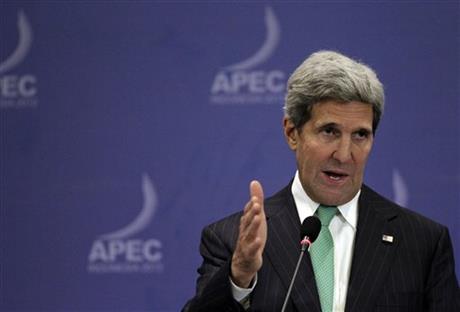
By ELAINE KURTENBACH
U.S. Secretary of State John Kerry speaks during a press conference at the Asia-Pacific Economic Cooperation (APEC) summit in Bali, Indonesia, Saturday, Oct. 5, 2013. Kerry on Saturday urged Congress to end the partial government shutdown and think “long and hard” about the message U.S. sends the world when “we can’t get our own act together.” (AP Photo/Wong Maye-E)
BALI, Indonesia (AP) — Talks on a Pacific trade pact are forging ahead with hopes of meeting a year-end deadline still intact, officials said Saturday, despite President Barack Obama’s absence due to the government shutdown.
Obama had intended to thrash out issues with leaders of the 11 other trans-Pacific Partnership member countries on the sidelines of an Asia-Pacific regional summit in Bali on Monday and Tuesday.
Instead he ended up shelving the trip to focus on resolving the standoff over funding the U.S. government. Still, U.S. and other senior officials sought to downplay the potential loss of momentum in the trade talks known as TPP.
“I do want to make clear none of what is happening in Washington diminishes by one iota our commitment to our partners in Asia, including our efforts to promote trade and investment throughout the region,” Secretary of State John Kerry, who is standing in for Obama, said Saturday.
Both Kerry and U.S. Trade Representative Michael Froman said that ministers were determined to put together a framework for the U.S.-led pact, a trading bloc that Obama considers a vital part of the “rebalancing” of U.S. strategy toward Asia.
“The TPP countries are strongly committed to working to conclude negotiations this year,” Froman said.
Senior economic ministers of the Asian-Pacific Economic Cooperation forum finished talks on Saturday by urging the 21 member economies to work toward a longer-term goal of achieving a free trade area encompassing the entire region.
A draft declaration by the APEC leaders, obtained by The Associated Press, hewed to the usual formulations of such communiques in urging “renewed urgency” on negotiations for global trade rules.
With the Doha round of World Trade Organization talks stalled for years, countries have instead been opting for country to country deals and other arrangements narrower than the WTO’s global mandate.
But a new commitment to WTO talks on information technology has raised hopes for progress in other areas at high-level WTO meetings planned for December in Bali.
“There is a hopeful sign this week of our ability to work creatively together to solve problems,” Froman said. “We were happy to work with China and others to get the information technology talks back on track.”
He said negotiators had made “significant progress” in Bali on the Pacific trade pact talks. New Zealand Prime Minister John Key agreed to chair the TPP leaders’ meeting in Obama’s stead.
The pact has been billed as a “21st century” trade agreement: an attempt not just to slash tariffs but also tackle nontariff barriers to trade, while protecting labor rights. Participants, which account for 40 percent of world trade, include Australia, Brunei, Canada, Chile, Japan, Malaysia, Mexico, New Zealand, Peru, Singapore, the United States and Vietnam.
Complex hurdles remain both in reaching consensus among the 12 nations and in persuading citizens and businesses in each country that the agreement is in their national interest.
Japan, which only formally joined the negotiations in July, is under pressure from the U.S. to open up its auto and insurance industries. Prime Minister Shinzo Abe, meanwhile, faces stiff domestic opposition, including from Japanese farmers who fear that foreign imports could drive them out of business.



